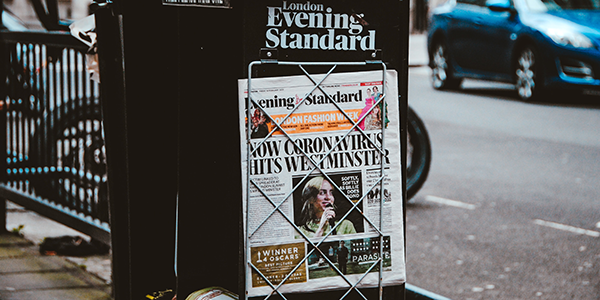Faced with an ‘infodemic’ of fake news about Covid-19, most people are checking their facts – but we mustn’t be complacent
As fake news spreads about Covid-19, early evidence suggest that most people are responding sensibly, and double-checking the information they receive. However, given trust in journalism remains low, it remains vital, argues Paul Reilly, that we all act responsibility, and verify what we read and watch.

Photo by Hello I’m Nik on Unsplash
Many of us have been exposed to coronavirus ‘fake news’ stories over the past few months. Conspiracy theorists have falsely linked Covid-19 to the rollout of 5G networks, leading to 20 phone masts being vandalised in the UK. There has also been much misinformation about how to combat the virus. While sipping water is a harmless but ineffectual ‘cure’, people have also drank bleach and methanol in the mistaken belief it would protect them from coronavirus.
The World Health Organization characterises the crisis as an ‘infodemic’, in which the over-abundance of information makes it hard for citizens to get the reliable guidance they need. By way of response, the European Union has recently announced plans to work with social media companies to remove ‘myths and fake news’. In the UK, a Rapid Response Unit has been created to ‘crack down’ on ‘fake experts’ providing misleading advice that might cost lives. Online platforms have joined this ‘fight’ against Covid-19 misinformation, with Twitter promising to remove content contradicting the advice of local and global public health authorities. Facebook has also banned misleading ads for test kits and face masks, and pledged to invest US$100 million to support news media and factchecking organisations.
It is difficult to fully assess the scale of Covid-19 disinformation and misinformation online. Research conducted by the Pew Research Center and Ofcom in the past month suggests that as many as one in two people in the UK and US have come across false or misleading information about the virus. We also have some evidence of the type of false information being distributed via online platforms. EU monitoring teams identified 283 examples of disinformation being circulated by pro-Kremlin media outlets between January and March 2020, including claims that zinc was a ‘miracle cure’ and that the virus was a biological weapon manufactured in the US. During the same period, 225 pieces of misinformation were classified as either false or misleading by fact-checking organisation Full Fact. The Reuters Institute for the Study of Journalism found that the majority (59%) involved the reconfiguration of accurate information rather than being completely fabricated, with misinformation from politicians and public figures accounting for 69% of the total social media engagement in the study. These typically involved false claims about the actions taken by public health authorities and the extent of its spread in specific geographic areas.
Early indications are that the worst fears about the impact of coronavirus ‘fake news’ on social media may not be realised. Ofcom found that a larger proportion of those citizens exposed to misinformation checked it with either family and friends (13%) or a fact-checking resource (10%) compared to those who forwarded it to their social networks without any form of verification (7%). Citizens are also likely to use credible sources to find out how to protect themselves from Covid-19. The Edelman Trust Barometer found that 64% of participants in ten different countries were getting most of their information from major news organisations, compared to just 38% who used online platforms. In the UK, the BBC has been the main news source about the pandemic for 36% of citizens, with only 5% turning to social media. While 18–24 year olds were more likely than other age groups to use social media to find information on the virus, they too identified the BBC as their most important news source. Both studies found a high degree of public confidence in official sources such as the WHO and scientists, in comparison to politicians, who were not widely believed to have responded responsibly to the pandemic.
Nevertheless, there is not the time for complacency in the global fight against potentially harmful misinformation about Covid-19. Generally positive perceptions of mainstream media coverage did not translate into greater trust in professional journalism with only 50% of respondents in these ten countries trusting the news media to tell the truth about the virus. The US, the country with the most Covid-19 cases at the time of writing, also illustrates how misinformation amplified by politicians such as President Donald Trump can shape public perceptions of the crisis. While 43% accepted the virus came about naturally, 23% believed it was intentionally developed in a lab, a conspiracy theory shared by politicians such as Republican Senator Tom Cotton. Two in ten believed that a vaccine would be publicly available within a few months, echoing a claim made by Trump during one of his daily White House press briefings which has been dismissed by public health experts.
Whether these beliefs directly influence the behaviour of citizens remains to be seen. However, they should serve as a warning: we are all first responders in the ‘infodemic’. It is our responsibility to verify information about the virus before we share it, especially when it comes from politicians.
This post represents the views of the author and not those of Democratic Audit.
About the author

Paul Reilly is Senior Lecturer in Social Media & Digital Society at the University of Sheffield.





 Democratic Audit's core funding is provided by the Joseph Rowntree Charitable Trust. Additional funding is provided by the London School of Economics.
Democratic Audit's core funding is provided by the Joseph Rowntree Charitable Trust. Additional funding is provided by the London School of Economics.
Sir, when talking about spread of disinformation, you somehow managed to to overlook awkward issue of “no clear evidence of human to human transmission”, as claimed by WHO in January. Already in that time Taiwan was screaming otherwise, but as it is not an officially recognised country, its information should be discarded, to please powers like China.
When trying to prevent spread of dumbest rumours, there is something self defeating in picking WHO as some golden standard. One could have easily selected any organisation with more democratic origin and without serious governance issue like CDC or ECDC.